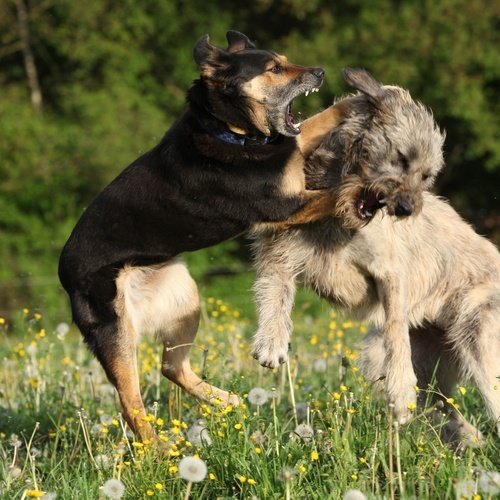
Nevada law prohibits all activities related to organized dog fighting, including:
- Watching a dog fight,
- Organizing a dog fight,
- Managing a dog fighting venue, and
- Possessing a dog meant for fighting
People can still be convicted for dog fighting even if no spectators showed up to the fight, no money was gambled, and no animals were hurt.
Penalties
It may be possible to plea bargain dog fighting charges down to a lesser offense or a dismissal. Otherwise, the penalties turn on the specific charge:
|
Nevada dog fighting offense |
Penalties (for a first-time offense) |
| Owning or managing a dog fighting venue | Gross misdemeanor:
|
| Instigating or participating in a dog fight | Category D felony:
|
| Possessing or selling a dog for dog-fighting | A first offense is a category E felony. This carries probation and a suspended sentence. (But if the defendant has two or more prior felony convictions, the court may impose one to four years in Nevada State Prison and up to $5,000 in fines.) |
| Being a spectator at a dog fight | Gross misdemeanor:
|
Defenses
Common defense strategies to Nevada dog fighting charges include showing that:
- The defendant had no criminal intent,
- The defendant was falsely accused, and
- The police conducted an unlawful search
If the D.A. fails to prove guilt beyond a reasonable doubt, then the charge should be dismissed.
In this article, our Las Vegas criminal defense attorneys will discuss:
- 1. Is dogfighting illegal in Nevada?
- 2. Will I lose my dog?
- 3. Can I go to jail?
- 4. How do I fight the charges?
- 5. Can I seal the case?
- 6. Will I get deported?
- 7. Related offenses

1. Is dogfighting illegal in Nevada?
Yes. Dogfighting is defined as an organized fight between two or more dogs, sometimes until one of the animals dies. People typically gather to watch and gamble on these fights.
Specifically, Nevada law prohibits the following four dog fighting-related activities:
- Knowingly keeping or managing a dog fighting venue;
- Knowingly organizing or participating in a dog fight;
- Possessing or purchasing a dog with the intent to use it to fight; and
- Knowingly witnessing a dog fight
Note that it does not matter whether any gambling occurs or even if there are any spectators watching the fight. Merely the act of contributing to or causing a dog fight is criminal under NRS 574.060 and 574.070.
Also note that farmers are permitted to use dogs for the lawful management of livestock. Likewise, hunters may use dogs in the assistance of lawful hunting.1
1.1 Federal dog fighting laws
Prosecutors may press federal charges when the alleged dog fighting operation crosses state lines.2 The most notorious example from current events is NFL star Michael Vick. In his case, some of the dogs were hanged, drowned, shot, or electrocuted if they did not die in the ring.3
2. Will I lose my dog?

Yes. Law enforcement may legally confiscate dogs upon probable cause that they are used for dog-fighting. They will remain in state custody pending the outcome of the criminal case.4
3. Can I go to jail?
The punishments depend on the specific actions the defendant is accused of and whether the defendant has past convictions:
|
Nevada dog fighting offense |
Penalties |
| Owning or managing a dog fighting venue (NRS 574.060) | A first offense is a category E felony. This carries probation and a suspended sentence. (But if the defendant has two or more prior felony convictions, the court may impose one to four years in Nevada State Prison and up to $5,000 in fines.)
A second or subsequent offense is a category D felony:
|
| Instigating or participating in a dog fight (NRS 574.070) | A first offense is a category D felony:
A second offense is a category C felony:
A third of subsequent offense is a category B felony:
|
| Possessing or selling a dog for dog-fighting (NRS 574.070) | A first offense is a category E felony, carrying probation and a suspended sentence. (But if the defendant has two or more prior felony convictions, the court may impose one to four years in Nevada State Prison and up to $5,000 in fines.)
A second or subsequent offense is a category D felony:
|
| Being a spectator at a dog fight (NRS 574.070) | A first offense is a gross misdemeanor:
A second or successive conviction is a category E felony. This carries probation and a suspended sentence. (But if the defendant has two or more prior felony convictions, the court may impose one to four years in Nevada State Prison and up to $5,000 in fines.)6 |
A dog fighting conviction in federal court carries a maximum punishment of five (5) years in federal prison and/or a fine.7
4. How do I fight the charges?
Although dog fighting is a very serious charge, several possible defenses exist that could result in the case getting dropped. The following are just some strategies a criminal defense attorney may explore using to fight dog fighting allegations:
- The defendant had no criminal intent
- The defendant was falsely accused
- The police search was unlawful
Note that it is not a defense if the dogs were uninjured, no gambling took place, or no spectators showed up.
4.1. The defendant had no criminal intent
Participation in dog fighting activities has to be willful in order to qualify as criminal.8
Example: Charles breeds pit bulls in Nevada. Patrick buys one of these pit bulls to use in an organized dog fight. Police show up at the fight and arrest Patrick. When Patrick tells the police where he got the pit bull, the police arrest Charles for selling a dog for dog fighting. But as long as the D.A. cannot prove that Charles knew about Patrick’s purpose for buying the pit bull, the charges against Charles should be dismissed.
Common evidence that may demonstrate criminal intent…or the lack thereof…includes the defendant’s email and text communications, voicemails, recorded conversations, surveillance video, and eyewitnesses.
4.2. The defendant was falsely accused
There are many reasons why people may lodge wrongful allegations against someone else, such as revenge, anger, or a misunderstanding.
Example: Nancy is enraged at her neighbor Bill for letting his dogs bark all day. To get back at him, she calls the Las Vegas Metropolitan Police and claims she saw Bill host a dog fight in his backyard. The police question Bill, who produces angry letters and voicemails from Nancy threatening to ruin his life. Since there is no other evidence that Bill hosted a dog’s fight other than Nancy’s allegations, the police decide not to arrest Bill. Instead, they arrest Nancy for filing a false police report.
If Bill’s case in the above example did progress to trial, his criminal defense attorney could try to impeach Nancy’s credibility through cross-examination. As long as the D.A.’s evidence is ultimately too ambiguous, unreliable or insufficient to prove that Bill participated in a dog fight, the case should end with an acquittal.
4.3. The police search was unlawful
Part of the defense attorney’s job is to investigate not only the defendant’s actions but also law enforcement’s behavior to search for any and all mistakes they may have made.

Example: A Henderson police officer gets a tip that Mark is growing marijuana at his home. The officer shows up to Mark’s house to ask to search it, but no one is home. The officer is too lazy to get a warrant and decides to break in to search for the marijuana. While inside he finds evidence of organized dog fighting, and he then arrests Mark when he gets home. After the D.A. presses charges, Mark’s defense attorney files a motion to suppress asking the judge to exclude all the evidence the officer unearthed from the illegal, warrantless search of the home. If the judge agrees, the D.A. may throw out the case for lack of proof.
So even if Mark in the above example did engage in organized dog fighting, the officer’s misconduct could be enough to get the entire matter dropped.
5. Can I seal the case?
Usually yes, though the waiting period to get a seal depends on the specific offense and whether the defendant has previous convictions:
|
Criminal category of Nevada dog fighting offense |
Waiting period to get a record seal |
Category B felony:
|
5 years after the case ends |
Category C felony:
|
5 years after the case ends |
Category D felony:
|
5 years after the case ends |
Category E felony:
|
2 years after the case ends |
Gross misdemeanor:
|
2 years after the case ends |
Misdemeanor:
|
1 year after the case ends9 |
| Dismissed charges (no conviction) | No waiting period10 |
Learn more about how to get a record seal in Nevada. Note that federal dog fighting convictions may not be sealed.
6. Will I get deported?
Possibly. Dog fighting is considered a crime involving moral turpitude, which is a type of deportable offense.11

Non-citizens who are charged with dog fighting should retain an experienced criminal defense and immigration attorney right away. The attorney may be able to negotiate with the prosecutor to get the charge either dismissed or reduced to a non-removable offense.
7. Related offenses
7.1. Animal cruelty
Animal cruelty laws prohibit several types of animal mistreatment, including:
- torturing or abandoning,
- poisoning,
- mistreatment of police animals or show dogs,
- abandoning a disabled animal,
- carrying animals in a cruel manner, and
- leaving a cat or dog in a hot or cold vehicle
Depending on the circumstances of the case, defendants face misdemeanor or felony charges.12
7.2. Dog racing (NRS 207.235)
Even though Nevada is a state built on gaming, dog racing laws prohibit betting on dogs. Conducting a dog race for the purpose of gambling is a misdemeanor, carrying:
- up to 6 months in jail, and/or
- a fine of up to $1,00013
7.3. Vicious dog laws (NRS 202.500)

Under Nevada dog bite laws, it is a crime to knowingly keep a vicious dog for more than seven (7) days after having notice that the dog is vicious. A vicious dog is one that has:
- continued to act menacingly after being classified by authorities as “dangerous”; or
- caused substantial bodily harm or death to a human being.
Unlawfully keeping a vicious dog is a misdemeanor, carrying:
- up to 6 months in jail, and/or
- a fine of up to $1,000
But if the vicious dog causes substantial bodily harm to another person, the dog’s owner or keeper face charges for a category D felony, carrying:
- 1 – 4 years in prison, and/or
- a fine of up to $5,00014
7.4. Conspiracy (NRS 199.480)
Conspiracy is when two or more people agree to commit a crime. Even if they do not succeed in carrying out the crime, they can still be convicted of conspiracy.
The penalties for conspiracy depend on the underlying crime that the alleged conspirators agreed to commit.15
Call a Nevada criminal defense attorney…
If you have been accused of violating Nevada dog fighting laws under NRS 574.060 or 574.070, contact our Las Vegas criminal defense attorneys for a consultation. Perhaps we can negotiate with the D.A. to get the charges thrown out or lowered. And if necessary we can take your case to a jury.
Also see our article about keeping a vicious dog (NRS 202.500).
Arrested in California? Go to our information page on Penal Code 597.5 PC.
Arrested in Colorado? Go to our information page on Colorado animal fighting laws.
Legal References
- NRS 574.060.
- 7 USC § 2156.
- Elizabeth Tyree & Chris Hoffman, Michael Vick talks repentance, redemption, and restoration at Liberty’s Convocation, ABC 13 WSET (January 29, 2018).
- NRS 574.080; NRS 574.090; any suspected dog fighting activity may be reported to the Humane Society of the United States.
- NRS 574.060.
- NRS 574.070.
- 18 USCS § 49.
- NRS 574.060; NRS 574.070.
- NRS 179.245.
- NRS 179.255.
- 8 USC § 1227.
- NRS 574.100-.235.
- NRS 207.235.
- NRS 202.500.
- NRS 199.480.

